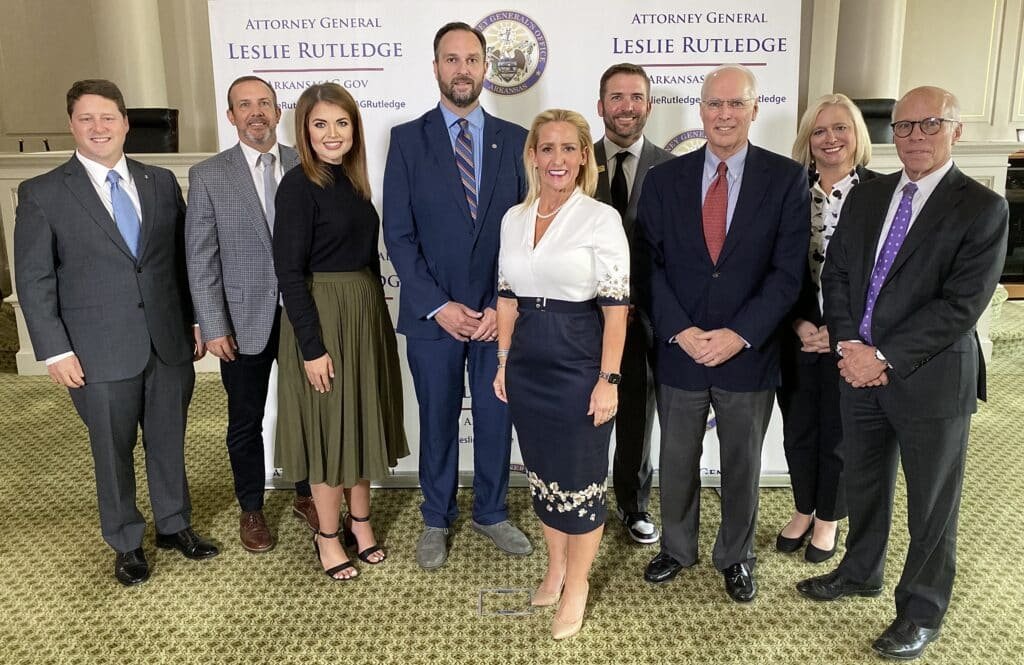LITTLE ROCK – Arkansas Attorney General Leslie Rutledge welcomed almost 650 participants to the 12th Annual Drug Abuse Prevention Summit, which was held at the Hot Springs Convention Center. The annual event is a free training and educational opportunity for Arkansas law enforcement, medical professionals, pharmacists, educators, Peer Recovery Specialists and families.
“Drug abuse continues to plague communities across the nation,” said Attorney General Leslie Rutledge. “Over the years, this training has provided much needed support to those who are on the frontlines serving their community. I am hopeful that it will continue to be the foundational training as Arkansas collectively battles the drug epidemic.”
Summit attendees heard from Dr. Bertha Madras, a professor of psychobiology at Harvard Medical School. Dr. Madras served as a panelist at the Vatican Pontifical Academy of Sciences in 2017, and was appointed to be one of six members of the President’s Commission on Combating Drug Addiction and the Opioid Crisis. Fred Muench, a clinical psychologist and the President of The Partnership to End Addiction, also addressed summit attendees. Mark Westfall, a psychiatrist specializing in child, adolescent, and adult psychiatry, spoke about five ways to help treat addiction. Westfall is a national recipient of the APA/Mead Johnson Fellowship Award in community psychiatry. He has previously held positions as Medical Director of the Community Mental Health Center in Charleston as well as President of the Frank Kay Psychiatric Clinic in Birmingham. Westfall is the President and Owner of Westfall Psychiatric Services and a radio talk show co-host for “Oh Brother Radio” and “Doc Talk.”
The summit comes the day after Rutledge announced $1 million in funding for the Arkansas Adult Drug Court Program. This funding continues Rutledge’s legacy and commitment to fighting drug abuse across Arkansas. This February, Rutledge announced a $26 billion opioid settlement agreement with drug distributors and Johnson & Johnson, resulting in Arkansas receiving $216 million to fight the opioid crisis. Additional data and information related to the opioid epidemic in Arkansas may be found here.
In addition to the Attorney General’s office, the Summit is sponsored by Arkansas Drug Director Boyce Hamlet, Criminal Justice Institute, Arkansas Pharmacy Board, Arkansas Alcohol Drug Coordinating Council, Arkansas Association of Chiefs of Police, Arkansas Department of Health, Arkansas Department of Human Services, Arkansas Medical Board, Arkansas National Guard, Arkansas National Guard Counterdrug Program, Arkansas State Board of Nursing, Arkansas Prevention Network, Arkansas Prescription Drug Monitoring Program, Federal Bureau of Investigation, Gulf Coast HIDTA, National Association of Boards of Pharmacy Foundation, University of Arkansas at Little Rock MidSOUTH Center for Prevention and Training, University of Arkansas for Medical Sciences and the U.S. Drug Enforcement Administration.
Arkansans looking for more information on training, resources and presentations should visit ArkansasAG.gov.
LITTLE ROCK— Arkansas Attorney General Leslie Rutledge announced a $1 million allocation to provide additional funding for Arkansas’s Adult Drug Court Program. Rutledge’s announcement will provide needed funds to the Arkansas Administrative Office of the Courts in order to support the Adult Drug Court Program across Arkansas.
“Throughout my career as a practicing attorney, former prosecutor, and especially as Attorney General, I have seen the devastation that substance abuse has brought upon our communities,” said Attorney General Leslie Rutledge. “This allocation will equip Arkansas courts to continue treating and serving individuals on their journey to recovery.”
The first drug court began in Arkansas in 1994. Over time, these specialty courts have come to serve 49 counties across the state. The Adult Drug Court Program is a voluntary, 14 to 18 month program that utilizes evidence-based treatment and strict supervision of program participants by a judge, prosecuting attorney, defense attorney, treatment provider and law enforcement liaison in order to aid participants in achieving lasting recovery. This approach has a proven record of decreasing recidivism and promoting increased public safety.
In order to be eligible for Adult Drug Court, the individual must not have a previous conviction or pending charge of a serious felony offense involving violence, must not have a previous conviction or pending charge requiring registration as a sex offender, must have a moderate or severe substance use disorder and must be identified as high-risk, high-need. The Adult Drug Court team is composed of judges, program coordinators, prosecuting attorneys, defense attorneys, treatment providers, probation officers and law enforcement officers who have the final determination to grant or deny prospective participants access to the program.
Rutledge has been a constant advocate leading the legal efforts to combat the opioid crisis devastating Arkansans. This contribution comes from the more than half billion dollar settlement with opioid consulting firm, McKinsey & Company. A court found the company concealed its work in developing Purdue Pharmaceuticals’ marketing strategy which contributed to the nationwide opioid epidemic. In February of 2022, Rutledge also finalized a $26 billion opioid settlement agreement with drug distributors and Johnson & Johnson, resulting in Arkansas’s receiving $216 million to fight the opioid crisis. In July of this year, the State negotiated a $9.75 million lump sum settlement with Endo Health Solutions Inc. and Pharmaceuticals Inc. Additional data and information related to the opioid epidemic in Arkansas may be found here.


